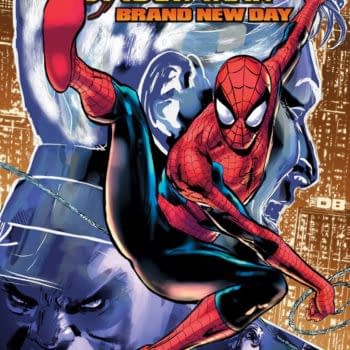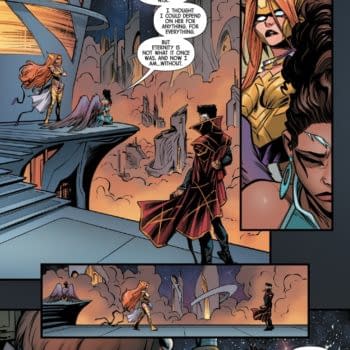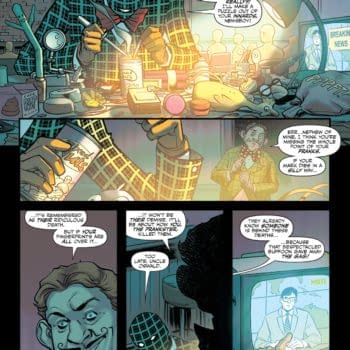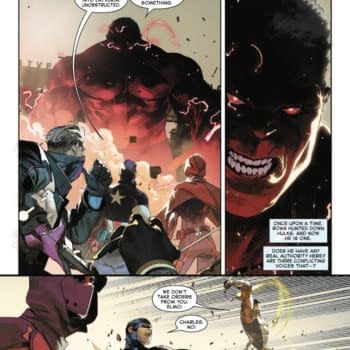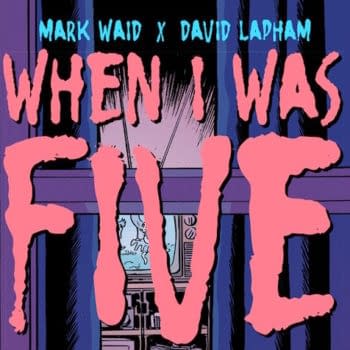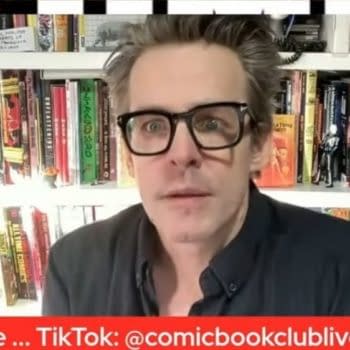Posted in: Comics | Tagged: Ande Parks, chris roberson, Comics, doc savage, Dynamite Entertainment, entertainment, Man of Bronze
A Savage Conversation – Chris Roberson Talks The Man Of Bronze
Doc Savage: Man Of Bronze has been out of the public eye for far too long, now Dynamite Entertainment has brought the character back with Chris Roberson at the helm. Roberson sits down with Ande Parks to talk about the new series and the artist they both have worked with.
ANDE PARKS: First off, I see you are lucky enough to be working with Bilquis Evely. She drew the Shadow Annual I got to write last year, and I was blown away. What have you noticed about how she approaches the work?
CHRIS ROBERSON: I've just been absolutely floored by what Bilquis brings to the table, issue after issue. She's just so meticulous with the details, from clothing to architecture to cars, and the "acting" of her figure work started strong and keeps getting stronger. With a book like DOC SAVAGE, I tend to include a lot of image reference, to try to help the artist give a sense of the various geographical locations or the historical period. And Bilquis just DEVOURS that stuff and makes it her own.
AP: You seem to be drawing some parallels between Doc Savage and another iconic superhero who is identified with the letter "S"… a superhero you have some experience with. Can you talk about the things Doc Savage has in common with other heroes, and what sets him apart?
CR: I don't think I'm intentionally drawing parallels, but considering the influence that Doc had one a LOT of characters that followed (and on another "Clark" in particular) a lot of that is fairly unavoidable. Doc is a self-made man, in that everything he is capable of doing is the result of years of constant training and study. And in that, he's similar to a character like Batman or even the Punisher, I suppose. But he also operates by a rigid moral code that limits his options to a fairly narrow range, which is more along the lines of a Superman or Captain America type. The main thing, though, is that he's less of a "crime fighter" than he is a scientist and doctor who sees crime as a disease that can be cured.
AP: Do you approach Doc Savage as a superhero or as a pulp character, or is the difference purely semantic in the first place and it makes no difference (a hero is a hero, etc.)?
CR: In my head, Doc is a "science hero," first and foremost. You can see some of the core elements of the superhero genre in him, of course. And naturally he's a pulp character in that he originated in the pulp magazines, but I think when people think "pulp hero" they often tend to gravitate towards figures like the Shadow or the Spider, and Doc really doesn't have much in common with them. He doesn't have a secret identity, or a costume (barring his "utility vest," I suppose), or even an origin story, for that matter. He's just a guy with an absolute faith in science who fights to oppose oppression.
AP: This issue focuses on the heroic characters in Doc Savage's orbit. Is that something you want to do with the series in general, or will there be a lot of solo Doc Savage action?
CR: We're trying to maintain a balance between Doc and the supporting cast. Because, obviously, Doc is the star of the show. But he was always the leader of a TEAM, and not really a solo operator. And as the series progresses, we'll gradually introduce new members of the supporting cast, as well, while keeping the narrative focus fixed firmly on Doc.
AP: I'm kind of obsessed with the trend in comics away from a third person, omniscient author's voice and toward a first person inner narrative approach. I like the way you use an omniscient narrator voice here. It's a little old school, and really fit the tone of the story, in my opinion. Is that going to be a consistent approach in this series?
CR: Yes, this whole arc is being narrated by someone in the modern day who is very familiar with Doc's exploits over the years, and as the stories move gradually closer to the present, we'll start getting hints as to just who it is we're listening to. (But definitely, as much as I like the first-person narration in general, I feel like it has been WAY overused in American comics the last decade or so, and as a result I often try to find different kinds of narrative voices that haven't been used quite so much in recent years.)
AP: This issue raises an interesting ethical question: does Doc Savage have the right to tinker with the criminal mind… to make them "right". Struck me as a classic Star Trek style question. Is that an ongoing theme in the series? Do you think there is a dilemma there, or is Doc totally within his rights?
CR: Oh, there is DEFINITELY a dilemma there, and that's something that's going to come back to haunt Doc later in the series. At this stage of his career, he's absolutely convinced that he is completely in the right, and that everything he's doing is justified. But things will happen as the series progresses that will cause him to doubt some of those decisions.
















